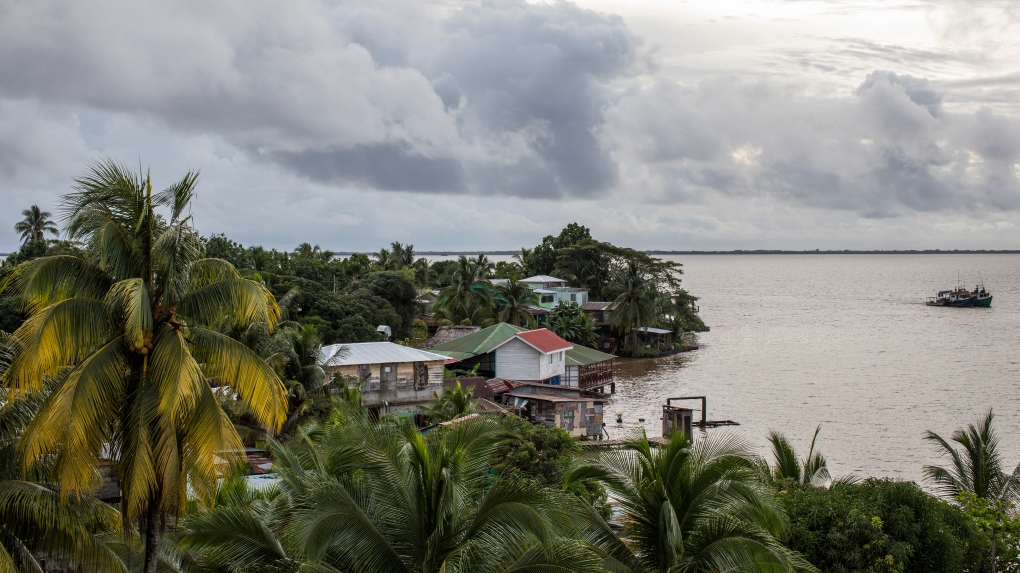
B.C. tenants evicted for landlord's use after refusing large rent increase to take over neighbouring suite
Ashley Dickey and her mother rented part of the same Coquitlam duplex in three different decades under three different landlords.
Hurricane Bonnie weakened a bit Tuesday night after several hours as the first major storm of the eastern Pacific season while off southern Mexico, though it wasn't a threat to land.
Bonnie was beginning to move farther away from Mexico’s Pacific coast, three days after crossing Central America as a tropical storm from the Caribbean and dropping heavy rain, contributing to at least two deaths.
Forecasters said they expected the hurricane, which grew into a Category 3 storm in the afternoon before losing a little power after nightfall, to keep heading generally westward farther out into the open sea. But the U.S. National Hurricane Center said Bonnie was causing rough surf on parts on of Mexico's southwestern coast.
Bonnie had maximum sustained winds of 110 mph (175 kph) late Tuesday, which is the very top of Category 2, according to the hurricane centre. It was centred 545 kilometres south-southwest of Cabo Corrientes, near the Mexican resort town of Puerto Vallarta, and was moving west-northwest at 15 mph (24 kph).
The storm caused heavy flooding while crossing sodden Nicaragua after making landfall as a tropical storm on the country’s Caribbean coast late Friday.
Two people died in separate events related to flooding, Nicaragua’s army said in a statement. It said 40-year-old Alberto Flores Landero died trying to cross the swollen Mati river in Siuna in Nicaragua’s northeast and Juan Carlos Alemán, 38, died trying to help passengers from a bus that fell into the Ali Bethel river in the same area.
The Family Ministry said it distributed mattresses to families displaced by flooding in Rama, west of Bluefields. Images from the area showed water up to rooflines and people navigating streets in boats.

Ashley Dickey and her mother rented part of the same Coquitlam duplex in three different decades under three different landlords.
A man who fell into a crevasse while leading a backcountry ski group deep in the Canadian Rockies has died.
A new survey by Dalhousie University's Agri-Food Analytics Lab asked Canadians about their food consumption habits amid rising prices.
MPP Sarah Jama was asked to leave the Legislative Assembly of Ontario by House Speaker Ted Arnott on Thursday for wearing a keffiyeh, a garment which has been banned at Queen’s Park.
Charlie Woods failed to advance in a U.S. Open local qualifying event Thursday, shooting a 9-over 81 at Legacy Golf & Tennis Club.
As Donald Trump was running for president in 2016, his old friend at the National Enquirer was scooping up potentially damaging stories about the candidate and paying out tens of thousands of dollars to keep them from the public eye.
After Prime Minister Justin Trudeau said the federal government would still send Canada Carbon Rebate cheques to Saskatchewan residents, despite Saskatchewan Premier Scott Moe's decision to stop collecting the carbon tax on natural gas or home heating, questions were raised about whether other provinces would follow suit. CTV News reached out across the country and here's what we found out.
A Montreal actress, who has previously detailed incidents she had with disgraced Hollywood producer Harvey Weinstein, says a New York Court of Appeals decision overturning his 2020 rape conviction is 'discouraging' but not surprising.
Caleb Williams is heading to the Windy City, aiming to become the franchise quarterback Chicago has sought for decades.

Mounties in Nanaimo, B.C., say two late-night revellers are lucky their allegedly drunken antics weren't reported to police after security cameras captured the men trying to steal a heavy sign from a downtown business.
A property tax bill is perplexing a small townhouse community in Fergus, Ont.
When identical twin sisters Kim and Michelle Krezonoski were invited to compete against some of the world’s most elite female runners at last week’s Boston Marathon, they were in disbelief.
The giant stone statues guarding the Lions Gate Bridge have been dressed in custom Vancouver Canucks jerseys as the NHL playoffs get underway.
A local Oilers fan is hoping to see his team cut through the postseason, so he can cut his hair.
A family from Laval, Que. is looking for answers... and their father's body. He died on vacation in Cuba and authorities sent someone else's body back to Canada.
A former educational assistant is calling attention to the rising violence in Alberta's classrooms.
The federal government says its plan to increase taxes on capital gains is aimed at wealthy Canadians to achieve “tax fairness.”
At 6'8" and 350 pounds, there is nothing typical about UBC offensive lineman Giovanni Manu, who was born in Tonga and went to high school in Pitt Meadows.
 A boat arrives in Bluefields Bay after Tropical Storm Bonnie hit the Caribbean coast of Nicaragua, July 2, 2022. (AP Photo/Inti Ocon)
A boat arrives in Bluefields Bay after Tropical Storm Bonnie hit the Caribbean coast of Nicaragua, July 2, 2022. (AP Photo/Inti Ocon)